Arbor Day UK schools outreach project
Will mighty oaks from little acorns grow?
Charlotte Bancroft
When the opportunity arises to take part in an initiative that strikes a chord, we must grab it! Arbor Day UK 2022 became a chance to do just that and more.
This day dedicated to arboriculture promotes the vital role of the arboricultural industry in the health and wealth of our treescape. Arbor Day centres upon bringing communities, businesses and organisations together to celebrate their tree planting accomplishments. Celebrating Arbor Day means more trees in the ground, which speaks for itself regarding the benefits to nature and society.
The ethos really resonated with me, and tapping into Arbor Day UK’s passion for engaging more people to take the initiative and celebrate, the idea for a school tree planting project began to sprout in my mind.
Arbor Day UK celebrated its third year in February 2022, hosted at Myerscough College Campus. Thanks to the support, encouragement and guidance of Myerscough tutor and Arbor Day UK founder Dr Duncan Slater, the schools project successfully contributed to the outreach activities.
Schools outreach rationale
Rewind to September 2021, the start of the second year of my FdSc (Foundation degree) in Arboriculture and Tree Management at Myerscough College, Preston. Students were required to complete an industry-related project that sparked interest and benefited the industry. As I worked on developing an idea, my thoughts always returned to the industry’s visibility.
When friends, family and occasionally the general public ask me about my decision to study trees, they are interested to learn more, and the concept is often entirely new to them. Most people I speak with have not previously heard the term 'arboriculture', and they generally follow up with ‘What are you going to do with that degree then?’ Most people have no idea that arboriculture is a profession. However, this was no surprise as, until recently, neither had I.
My moment of enlightenment came after googling ‘career with trees’. This discovery came after a lockdown-induced ‘back to nature’ epiphany, which led me to Myerscough College and to embracing a complete career change. Over the past two years, immersed in the most fascinating and fulfilling study, my life has changed dramatically and for the better. This industry has so much to offer and comprises some genuinely wonderful and passionate folk.
Delving deeper, it became clear to me that the apparent lack of public knowledge surrounding arboriculture has a devastating knock-on effect within the industry. For instance, difficulties faced due to a shortage of skilled arboricultural workers led to vacancy rates in 2019 that were 32.2% higher than the UK national average. Barriers reported were predominantly a lack of skills and low interest in the sector (Ornamental Horticulture Roundtable Group, 2019).
This situation is not only problematic for employers looking to fill positions, but the low numbers of graduates could impact the industry as a whole. The knock-on effect may hinder the deliverability of Defra’s England Tree Action Plan (ETAP), which aims to treble tree planting rates to hit targets of 30,000 ha per year. Successful planting and establishment at this scale requires many skilled workers and dedicated volunteers. The Institute of Chartered Foresters sent a position paper to ministers across the UK detailing serious concerns about the skills shortage in the sector, which it believes puts climate targets at risk (Institute of Chartered Foresters, 2021).
With the UK arboriculture industry contributing £709 million to the UK GDP (Arboricultural Association, 2018), it seems pertinent that attention should be focused on the industry, and would those organisations who strive to highlight the value of the sector not benefit from positive exposure and more significant support?
Little acorns
The evident lack of recruits, coupled with the glaring pressures of our climate crisis, formed the project’s direction and simultaneously fuelled my determination to champion Arbor Day UK. I felt that a schools initiative to get to the ‘root’ of these problems would be my best course of action. Education is vital in making change, so by giving children the chance to develop a feel for the environment, will their natural curiosity and urge to explore not do the rest?
This industry deserves recognition for its vital work in maintaining our greenspace, so it seemed pertinent to start with the youngest minds. School programmes such as the Arboricultural Association’s School Membership and other tree planting activities are vital to engaging youngsters wherever possible. These initiatives not only prove beneficial for children’s health and well-being but serve to promote arboriculture as a rewarding and fulfilling career choice.
The question is, will mighty oaks from little acorns grow? If we inspire the youngest minds, can we expect to see a future with more graduates fiercely advocating for trees and green spaces?
The project engaged a sector of society integral to our future stewardship of the Earth: our school-aged children, our budding green army in the making with fresh open minds who sadly, yet rightly, are becoming increasingly anxious about the planet’s health.
As I delved deeper into the current research, it became clear that recent years have seen an increased incidence of ‘climate anxiety’ being investigated in scientific studies. Children experience this condition due to their exposure to the realities of climate change.
One study showed that 1 in 5 children aged 8–16 has nightmares about climate change (Thomson Reuters Foundation, 2020). The associated stress from anxiety can cause children to experience changes in behaviour and development, which is also detrimental to scholastic achievement (Clayton et al., 2017).
However, as the saying goes, nature provides, and studies have shown that if children are engaged in nature stewardship, they are comforted to know that their actions are doing something to take care of the planet. Children’s well-being after participating in ‘green’ initiatives has been largely positive (Hayes et al., 2021). Empowerment can be contagious; by engaging children in stewardship, we may also engage their parents and teachers.
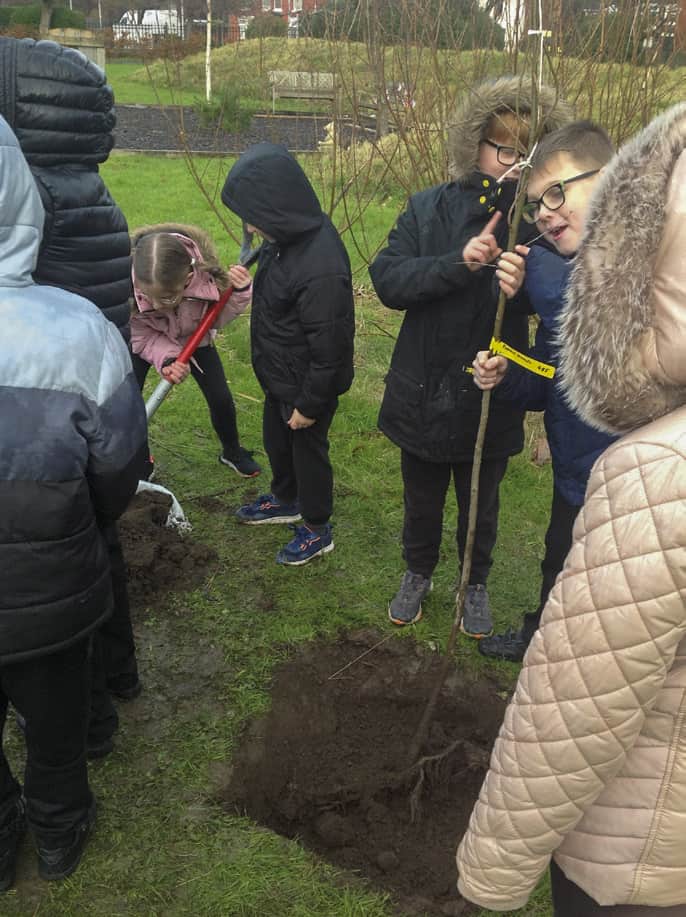
1. Hawes Side Academy. Students eagerly took turns digging the pit for their Populus tremula, 2022. (Photo: Hawes Side Academy)
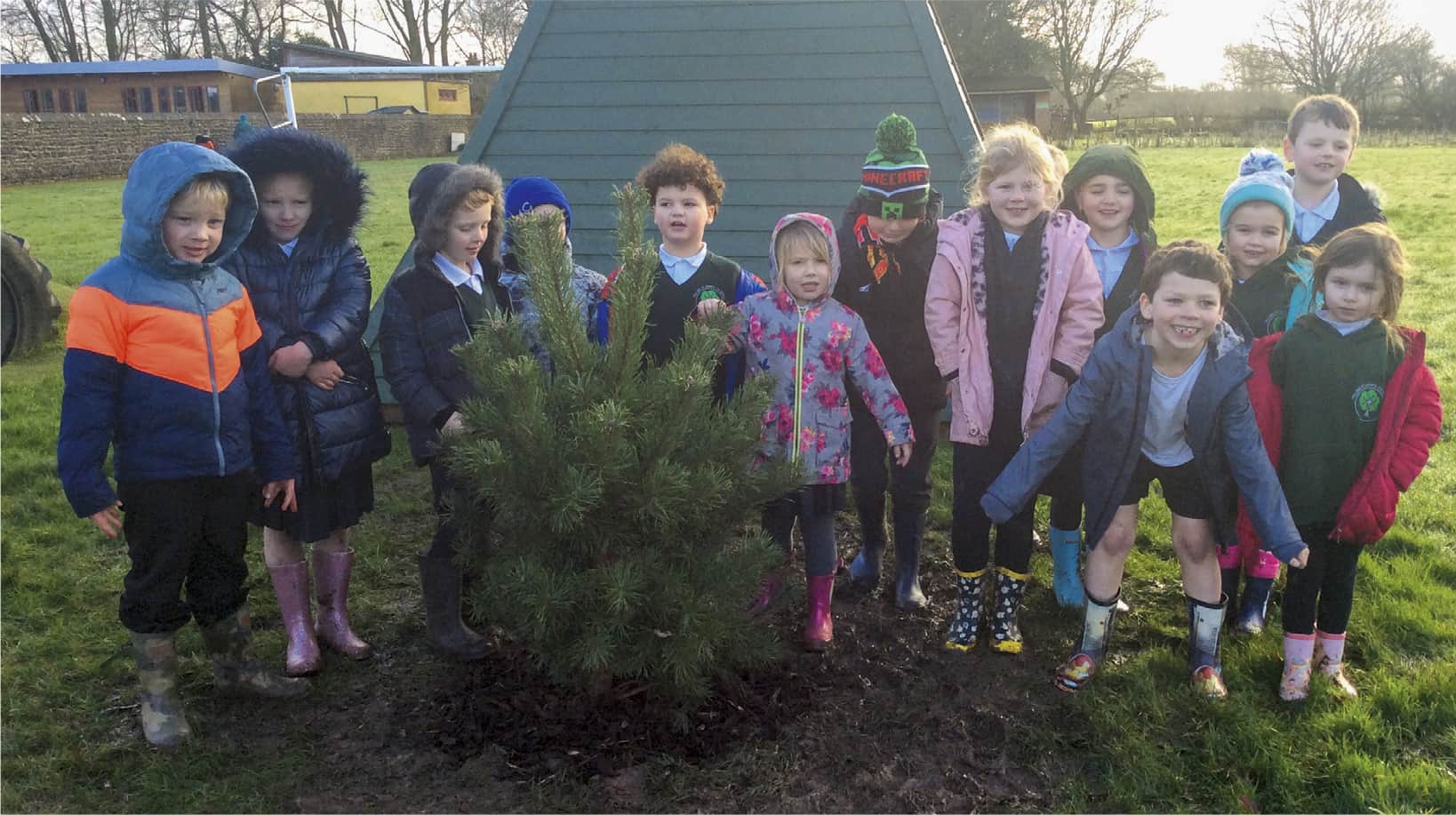
2. Pilling St Johns Primary. Happy faces beside their Pinus sylvestris, 2022. (Photo: Pilling St Johns Primary School)
My hope was that the project would not only provide a source of education but also give the children a chance to celebrate their achievements. By highlighting tree planting initiatives such as Arbor Day, the Queen’s Green Canopy and the work of the Woodland Trust (to name a few), we could show that more significant progress is underway. Perhaps children will begin to feel that there is reason to be hopeful, and this advocacy for green space will grow with them.
The tree planting
The initial plan was to work with just one local school for the project; however, thanks to the support of Arbor Day UK sponsorship from the Arboricultural Association, a multi-school outreach project germinated.
Over the next four months, ten schools in the Lancashire Fylde and Wyre districts embraced the initiative and welcomed a new tree to their grounds. Inclusivity was essential in this activity, with schools in rural and urban areas invited to participate, including primary, secondary, special education and pupil referral facilities.
This activity was a learning opportunity for Hodgson Academy’s eco group. The students chose to plant a Betula ermanii on the perimeter of their largely exposed sports field; the tree is visible at the student drop-off point. The planting site was discussed with each school to ensure suitability. Autonomy over site choice and species prompted further research opportunities.
Feedback has been hugely positive across the board, with teaching staff at Educational Diversity in Blackpool expressing delight that the activity was particularly fulfilling for some of their historically disengaged students who wholly embraced the initiative. Students greened up their KS2 outdoor area with a Sorbus aucuparia.
p>
Hawes Side Academy spoke of students ‘buzzing with information and interest at what they had done’, with the staff asking, ‘How can we get involved in more of these activities?’ (image 1)
Pilling St Johns Primary children wowed with their arboricultural knowledge. They chose to plant a Pinus sylvestris, exclaiming that their other trees were all deciduous (image 2)! Teachers reported that the children thoroughly enjoyed the activity ‘with lots of learning and lots of fun’.
Breck Primary fully embraced the initiative, with year six pupils listening intently to discussions on the importance of Arbor Day. The head kindly messaged to say, ‘The children learned so much, including how to prepare the soil, look after the roots, and what to expect as the tree settles into its new home.’
The new trees were all added to the Queen’s Green Canopy; schools received a virtual plaque in recognition for their contribution (image 3).
Post-planting follow-up emails were sent to the schools the following day with the Arboricultural Association’s Guide to young tree establishment attached. These documents proved an excellent resource to share with the schools and helped support points discussed during the activity.
Alongside guidance on correct planting according to BS 8545: Trees from nursery to independence in the landscapes (British Standards Institution, 2014), the importance of aftercare was emphasised as being paramount to the future health of their new tree. Further follow-up emails were sent to the schools in June 2022, reminding them to water their trees over the summer months. Schools replied, many sending images of their trees which are doing well (image 4).
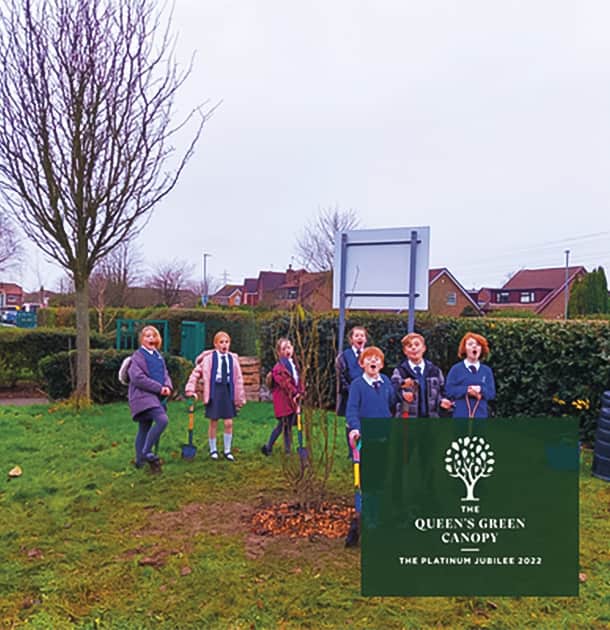
3. Carleton Green children say ‘Arbor Day’ for their Queen’s Green Canopy plaque photograph. (Photo: Carleton Green Community Primary School)
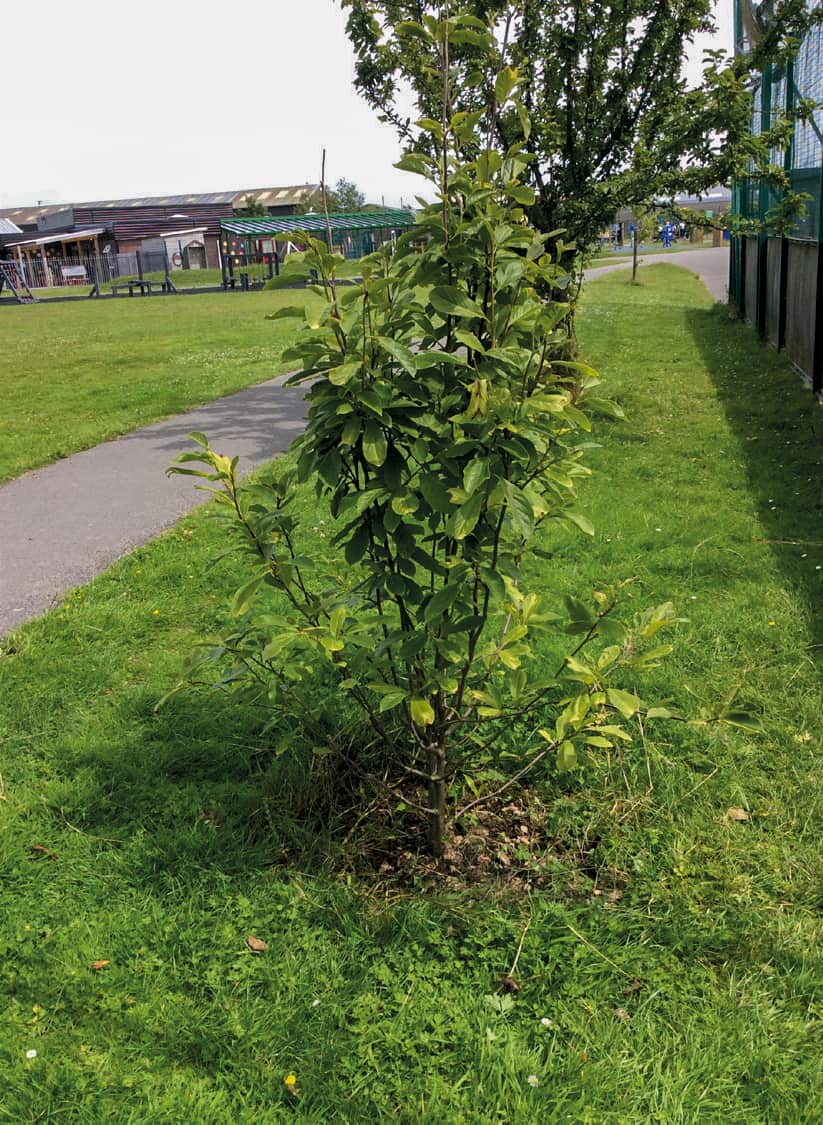
4. Magnolia soulangeana establishing well on the school grounds, Great Arley, 2022. (Photo: Great Arley School)
A lesson learnt
This activity was all part of the project’s aim, a drive to raise awareness of Arbor Day UK, promote the industry and encourage more schools to plant trees. Each planting was documented and shared on social media platforms, LinkedIn and Facebook. The posts discussed a variety of planting advice with a focus on planting depth – ‘let us see those root flares’ – while also giving some information on each species and its benefits to local biodiversity.
The project has been hugely rewarding, and it was thoroughly enjoyable to work with the children and their dedicated teachers on this activity.
A few valuable lessons were learnt along the way, too!
Lesson 1: Know when to ask for help!
Initially, my plan was to complete the planting activity alone; however, during a trial run, this quickly proved problematic. Digging while talking and engaging youngsters proved somewhat distracting for all!
Fortunately, a fabulous support team rallied (albeit the loyal recruits were my long-suffering family and friends) and proved invaluable to the project. Not only did these champions volunteer their transport, time and moral support but they also gave their physical energy. Overall, feedback showed that the benefits of this project were, for the most part, mutualistic, as not only did the schools thoroughly enjoy the activity but so it seems did the team!
Whether the time given up by volunteers was initially an act of altruism (if not partly motivated by loyalty to me personally), the volunteers expressed an increased sense of wellbeing post-activity. By working alongside stakeholders, we pooled our skills, resources and knowledge and the project ran smoothly, benefiting all involved. Put simply, we are stronger together.
Lesson 2: Never underestimate children
During this project, it was truly overwhelming and utterly heart-warming to see children of all ages and backgrounds engaged wholeheartedly with the initiative. Their enthusiasm for the activity and pure gusto for digging tree pits and knocking in stakes were impressive. Their awareness of the importance of biodiversity within our greenspaces was encouraging, and they offered surprisingly insightful questions, such as ‘What happens if we plant it too deep?’
The children seemed to lovingly embrace the natural world with ease and wonder, paying close attention to the features of their tree, such as bark, roots and buds (image 5). Oh, to harness that outlook, nurture it, and direct it towards the green economy!
Looking forward
This project aimed to not only plant more trees within our schools but to show our children how to do it correctly, ‘roots and all’, explaining why aftercare is critical. The activity opened up a fantastic dialogue with the youngsters about the significance of trees in and around their communities, hopefully fostering the beginnings of greenspace stewardship within the children.
Had I been given this introduction to the industry earlier, then perhaps I would have purposely walked the tree-lined path to Arboriculture from school.
If we continue to look forward by fostering nature stewardship within our young, it will also lead to greater industry recognition. If we nurture our ‘little acorns’ and support them to grow through focused green space education, perhaps future generations may hope to enjoy mighty oaks within their landscape.
The tree plantings were documented in a series of posts. Please see www.linkedin.com/in/charlotte-bancroft-6502261bb/ for more information.
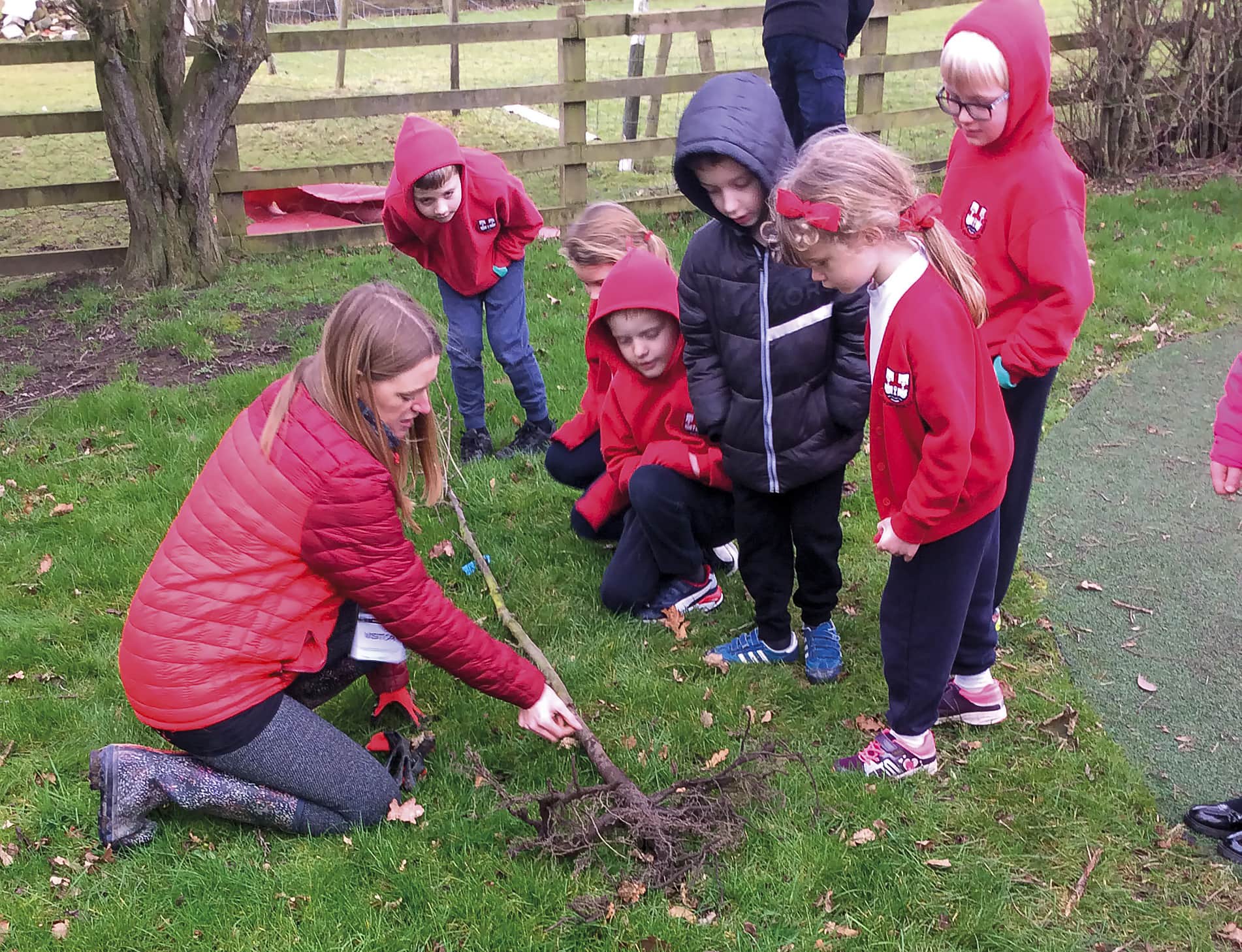
5. Attentive students at St Michaels on Wyre observe stem taper, 2022. (Photo: St Michaels on Wyre Primary School)
Charlotte Bancroft is studying for BSc(Hons) in Arboriculture and Urban Forestry at Myerscough College and was the winner of the AA Student of the Year Award 2022. She is passionate about involving more people in nature stewardship, such as schools and volunteer groups, and has a keen interest in the future health of our urban canopy, particularly street trees and how resilience can be achieved through diversity.
References
Arboricultural Association (2018). Arboricultural Association - Arboriculture Contributes £709 million to UK GDP. [online] Available at: www.trees.org.uk/News-Blog/Latest-News/Arboriculture-Contributes-%C2%A3709-million-to-UK-GDP [accessed 20 Oct 2021].
Clayton, S., Manning, C., Krygsman, K. and Speiser, M. (2017). Mental health and our changing climate: impacts, implications, and guidance. [online] Available at: www.apa.org/news/press/releases/2017/03/mental-health-climate.pdf [accessed 29 Sept 2022].
Hayes, K., Barocas, T., & Levy, S. (2021). Anxious for Action: Channeling Children’s Environmental Concerns into Empowerment. [online]. Available at: earthrangers.com/public/content/wildwire/Anxious-for-Action-Channeling-Childrens-Environmental-Concerns-Into-Empowerment.pdf [accessed 29 Sept 2022]
Institute of Chartered Foresters (2021). Forestry skills crisis puts climate targets at risk. [online]. Available at www.charteredforesters.org/forestry-skills-crisis-puts-climate-targets-at-risk [accessed 29 Sept 2022].
Ornamental Horticulture Roundtable Group (2019). 2019 Horticulture Sector Skills Survey - Sub-Sector Report: Arboriculture: A report for the Ornamental Horticulture Roundtable Group. [online] Available at: www.rhs.org.uk/science/pdf/horticulture-skills-report/sub-sector-report-arboriculture.pdf [accessed 29 Sept 2022].
Thomson Reuters Foundation (2020). One in five UK children report nightmares about climate change. Reuters. [online] 3 Mar. Available at: www.reuters.com/article/climate-change-children-idUSL1N2AV1FF [accessed 29 Sept 2022].
This article was taken from Issue 199 Winter 2022 of the ARB Magazine, which is available to view free to members by simply logging in to the website and viewing your profile area.